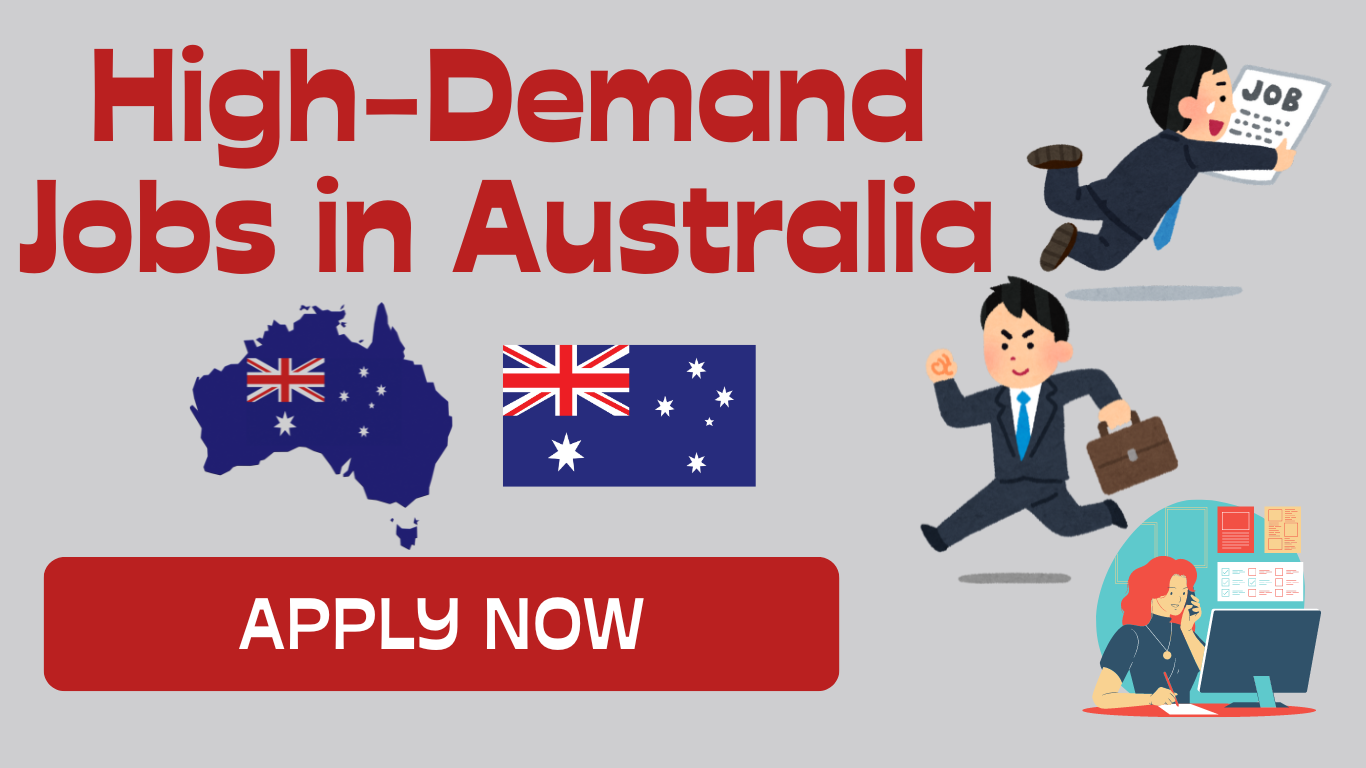Australia, known for its diverse culture, high standard of living, and robust economy, is an attractive destination for skilled professionals seeking lucrative job opportunities with visa sponsorship. This guide provides detailed information on high-paying jobs in Australia, the requirements to obtain these positions, the salary scale, and frequently asked questions (FAQs).
1. Overview of High-Paying Jobs in Australia
Australia offers a variety of high-paying job opportunities across different sectors, including healthcare, engineering, information technology, finance, and mining. Some of the top high-paying jobs in Australia with visa sponsorship include:
- Medical Practitioners (Doctors, Surgeons, Specialists)
- IT Professionals (Software Engineers, Data Scientists, IT Managers)
- Engineering Professionals (Civil Engineers, Mining Engineers, Electrical Engineers)
- Financial Managers and Accountants
- Mining Professionals (Geologists, Mining Engineers, Metallurgists)
2. Detailed Job Information and Requirements
Medical Practitioners
Roles and Responsibilities:
- Diagnose and treat illnesses
- Perform surgeries
- Provide specialist care in various fields (cardiology, neurology, etc.)
- Conduct medical research
Requirements:
- A recognized medical degree
- Registration with the Medical Board of Australia
- Relevant work experience
- English language proficiency (IELTS, OET)
- Completion of AMC exams (for international medical graduates)
IT Professionals
Roles and Responsibilities:
- Develop and maintain software applications
- Analyze and interpret data to support decision-making
- Manage IT projects and teams
- Ensure cybersecurity and data protection
Requirements:
- A bachelor’s degree in Computer Science or related field
- Relevant work experience
- Proficiency in programming languages (Python, Java, etc.)
- Certifications (AWS, Microsoft, Cisco)
- English language proficiency
Engineering Professionals
Roles and Responsibilities:
- Design and oversee construction projects
- Develop and implement engineering solutions
- Conduct feasibility studies and risk assessments
- Ensure compliance with safety and environmental regulations
Requirements:
- A bachelor’s degree in Engineering (Civil, Electrical, Mechanical, etc.)
- Relevant work experience
- Registration with Engineers Australia
- English language proficiency
Financial Managers and Accountants
Roles and Responsibilities:
- Manage financial operations and strategies
- Prepare financial reports and statements
- Conduct audits and compliance checks
- Advise on investment and risk management
Requirements:
- A bachelor’s degree in Finance, Accounting, or related field
- Relevant work experience
- Certification (CPA, CA)
- English language proficiency
Mining Professionals
Roles and Responsibilities:
- Conduct geological surveys and resource assessments
- Develop mining plans and strategies
- Ensure safe and efficient mining operations
- Conduct environmental impact assessments
Requirements:
- A bachelor’s degree in Geology, Mining Engineering, or related field
- Relevant work experience
- Registration with relevant professional bodies
- English language proficiency
3. Salary Scale for High-Paying Jobs
The salary scale for high-paying jobs in Australia varies depending on the role, level of experience, and location. Below are the average annual salaries for some of the top high-paying jobs:
- Medical Practitioners: AUD 200,000 – AUD 400,000+
- IT Professionals: AUD 100,000 – AUD 200,000
- Engineering Professionals: AUD 100,000 – AUD 180,000
- Financial Managers and Accountants: AUD 100,000 – AUD 160,000
- Mining Professionals: AUD 120,000 – AUD 220,000
4. Visa Sponsorship
Australia offers several visa options for skilled professionals seeking to work in the country. The most common visas for high-paying jobs include:
- Temporary Skill Shortage (TSS) Visa (Subclass 482):
- For skilled workers nominated by an employer
- Valid for up to four years
- Requires at least two years of relevant work experience
- English language proficiency required
- Employer Nomination Scheme (ENS) Visa (Subclass 186):
- For skilled workers nominated by an employer for permanent residency
- Requires relevant qualifications and work experience
- English language proficiency required
- Skilled Nominated Visa (Subclass 190):
- For skilled workers nominated by a state or territory government
- Permanent residency visa
- Points-based system
- Skilled Independent Visa (Subclass 189):
- For skilled workers not sponsored by an employer, state, or family
- Permanent residency visa
- Points-based system
5. Frequently Asked Questions (FAQs)
Q1: What are the most in-demand high-paying jobs in Australia? A1: The most in-demand high-paying jobs in Australia include medical practitioners, IT professionals, engineers, financial managers, and mining professionals.
Q2: How can I find a job with visa sponsorship in Australia? A2: To find a job with visa sponsorship in Australia, you can:
- Search job portals like SEEK, Indeed, and LinkedIn
- Contact recruitment agencies specializing in your field
- Network with industry professionals
- Attend job fairs and industry events
Q3: What are the English language requirements for skilled visas in Australia? A3: The English language requirements vary depending on the visa subclass. Generally, you need to take an English language test such as IELTS or OET and achieve a minimum score specified by the visa requirements.
Q4: How long does the visa sponsorship process take? A4: The visa sponsorship process duration varies depending on the visa type and individual circumstances. It can take anywhere from a few months to over a year.
Q5: Can my family accompany me on a sponsored visa? A5: Yes, most sponsored visas allow you to include your immediate family members (spouse and children) as dependents on your visa application.
Q6: Do I need to have my qualifications assessed for visa applications? A6: Yes, in most cases, you need to have your qualifications assessed by the relevant assessing authority in Australia to ensure they meet Australian standards.
Q7: What are the chances of getting permanent residency with a sponsored visa? A7: Many sponsored visas, such as the ENS Visa (Subclass 186), offer a pathway to permanent residency. Meeting the requirements and gaining sponsorship from an employer increases your chances of obtaining permanent residency.
Q8: Can I switch employers on a sponsored visa? A8: Switching employers on a sponsored visa can be challenging as it typically requires a new nomination and sponsorship process. It’s essential to check the specific conditions of your visa and consult with immigration authorities.
Q9: Are there age limits for applying for a skilled visa in Australia? A9: Yes, most skilled visas have an age limit, typically under 45 years. However, exceptions may apply in certain circumstances or for specific occupations.
Q10: What is the cost of applying for a skilled visa in Australia? A10: The cost of applying for a skilled visa varies depending on the visa subclass and individual circumstances. Fees can range from AUD 2,500 to AUD 4,000 or more, excluding additional costs for health checks, police certificates, and English language tests.
6. Steps to Apply for a High-Paying Job with Visa Sponsorship
Step 1: Research Job Opportunities
- Identify high-paying job opportunities in your field
- Research companies that offer visa sponsorship
- Use job portals, recruitment agencies, and professional networks
Step 2: Prepare Your Application
- Update your resume and tailor it to the Australian job market
- Write a compelling cover letter
- Gather necessary documents (qualifications, work experience, references)
Step 3: Apply for Jobs
- Submit applications through job portals, company websites, or recruitment agencies
- Follow up with potential employers
Step 4: Attend Interviews
- Prepare for interviews by researching the company and practicing common interview questions
- Attend interviews via phone, video call, or in-person
Step 5: Secure a Job Offer
- Negotiate salary and benefits
- Obtain a written job offer from the employer
Step 6: Apply for Visa Sponsorship
- Work with your employer to complete the visa sponsorship application
- Submit necessary documents and pay visa fees
- Attend any required health checks or police clearances
Step 7: Receive Visa Approval
- Wait for visa processing and approval
- Plan your move to Australia
Step 8: Start Your New Job
- Relocate to Australia
- Begin your new job and adapt to the Australian work environment
7. Conclusion
Australia offers a wealth of high-paying job opportunities for skilled professionals from around the world. With the right qualifications, experience, and determination, you can secure a lucrative position with visa sponsorship in fields such as healthcare, IT, engineering, finance, and mining. By understanding the requirements, navigating the visa process, and preparing thoroughly, you can achieve your career goals and enjoy the benefits of living and working in Australia.




I want to travel to Canada to be a scientist
It’s good opportunity if it is successful for us
I am interested to travel to Canada for work
Iam interested in job opportunity in Canada